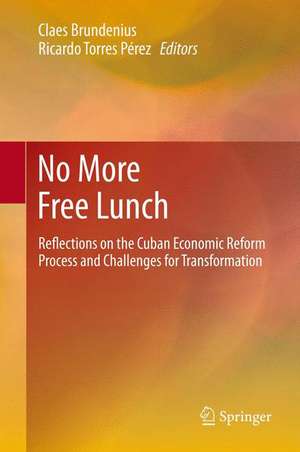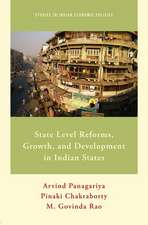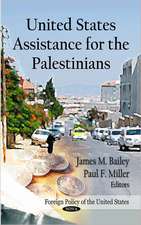No More Free Lunch: Reflections on the Cuban Economic Reform Process and Challenges for Transformation
Editat de Claes Brundenius, Ricardo Torres Pérezen Limba Engleză Hardback – 8 oct 2013
The result of these field visits and a subsequent workshop involving contributions from Cuban as well as non-Cuban scholars, this volume showcases unprecedented new insights into the process and prospects for reform along many dimensions, including foreign direct investment, import substitution, entrepreneurship and business creation, science and technology development, and fiscal policies. The resulting analysis, in a comparative perspective, provides a framework for future research as well as for business practice and policymaking.
| Toate formatele și edițiile | Preț | Express |
|---|---|---|
| Paperback (1) | 639.59 lei 6-8 săpt. | |
| Springer International Publishing – 23 aug 2016 | 639.59 lei 6-8 săpt. | |
| Hardback (1) | 644.18 lei 6-8 săpt. | |
| Springer International Publishing – 8 oct 2013 | 644.18 lei 6-8 săpt. |
Preț: 644.18 lei
Preț vechi: 757.85 lei
-15% Nou
Puncte Express: 966
Preț estimativ în valută:
123.30€ • 133.98$ • 103.64£
123.30€ • 133.98$ • 103.64£
Carte tipărită la comandă
Livrare economică 21 aprilie-05 mai
Preluare comenzi: 021 569.72.76
Specificații
ISBN-13: 9783319009179
ISBN-10: 3319009176
Pagini: 250
Ilustrații: XVI, 260 p. 51 illus., 41 illus. in color.
Dimensiuni: 155 x 235 x 22 mm
Greutate: 0.52 kg
Ediția:2014
Editura: Springer International Publishing
Colecția Springer
Locul publicării:Cham, Switzerland
ISBN-10: 3319009176
Pagini: 250
Ilustrații: XVI, 260 p. 51 illus., 41 illus. in color.
Dimensiuni: 155 x 235 x 22 mm
Greutate: 0.52 kg
Ediția:2014
Editura: Springer International Publishing
Colecția Springer
Locul publicării:Cham, Switzerland
Public țintă
ResearchCuprins
Chapter 1 Structural Problems and Changes in Cuba's Economic Model.- Chapter 2 The Economic Transformation Process in Cuba after 2011.- Chapter 3 Current Problems in the Cuban Economy and Necessary Reforms.- Chapter 4 Monetary and Financial Challenges in Cuba: Lessons from Vietnam.- Chapter 5 Food Production and Import Substitution in the Cuban Reform Process.- Chapter 6 Cuba's 'Apertura' to Small Enterprise.- Chapter 7 Entrepreneurship, Innovation and SMEs: What Cuba can Learn from the Vietnamese Reform Process.- Chapter 8 Science, Technology, Innovation Policies and the Innovation System in Cuba: Assessment and Prospects.- Chapter 9 Foreign Direct Investments in Cuba and Vietnam: Lessons Learned.- Chapter 10 Socially Responsible Enterprise: Local Development and Inclusive Economic Growth in Cuba.- Concluding Chapter Whither the Cuban Economy? Concluding Reflections.
Notă biografică
Claes Brundenius is Honorary Professor at the Research Policy Institute (RPI), Lund University, Sweden. He holds a PhD in Economic History from Lund University. Before joining the staff at RPI he was attached to the OECD Directorate for Scientific Affairs in Paris. He has been a Guest Professor at Pittsburgh University (1984) and Smith College (1987), USA. Between 1997 and 2003 he was Senior Researcher at the Centre for Development Research in Copenhagen. His main interest is research and policy studies on the role and impact of Science, Technology and Innovation policies and strategies in developing countries. His current work has focused on policy analysis of technological change and knowledge based development in developing and transition economies, notably in Latin America and the Caribbean, East Asia, and Southern Africa (SADC). His latest book (co-editor with Bo Göransson) is Universities in Transition – The Changing Role and Challenges for Academic Institutions (Springer, New York, 2011).
Ricardo Torres Pérez holds a PhD in Economic Sciences from the University of Havana. He is currently associate professor with the Centro de Estudios de la Economía Cubana (CEEC) at the University of Havana. He was a government scholar at Hitotsubashi University in Japan (2007-2009) and visiting researcher at Harvard University and the Ohio State University (2012). He has published in the Harvard International Review and has chapters in several books, including “Cincuenta años de la economía cubana” (Editorial Ciencias Sociales, Havana, 2010) and “Cuba: hacia una estrategia de desarrollo para los inicios del siglo XXI" (Editorial Universidad Javeriana de Cali, 2012).
Ricardo Torres Pérez holds a PhD in Economic Sciences from the University of Havana. He is currently associate professor with the Centro de Estudios de la Economía Cubana (CEEC) at the University of Havana. He was a government scholar at Hitotsubashi University in Japan (2007-2009) and visiting researcher at Harvard University and the Ohio State University (2012). He has published in the Harvard International Review and has chapters in several books, including “Cincuenta años de la economía cubana” (Editorial Ciencias Sociales, Havana, 2010) and “Cuba: hacia una estrategia de desarrollo para los inicios del siglo XXI" (Editorial Universidad Javeriana de Cali, 2012).
Textul de pe ultima copertă
In September 2010, the Cuban government decided to embark on an economic reform program, unprecedented after the Revolution in 1959. This opened up opportunities for Cuban economists and scholars to participate in the development of the reform program. Thanks to grants from SSRC (Social Sciences Research Council, New York) and the Norwegian Ministry of Foreign Affairs, several researchers from the Cuban think tank CEEC (Center for Studies of the Cuban Economy, Havana) got an opportunity to visit countries that could be of interest for the reform process, notably Vietnam, but also Brazil, South Africa and Norway.
The result of these field visits and a subsequent workshop involving contributions from Cuban as well as non-Cuban scholars, this volume showcases unprecedented new insights into the process and prospects for reform along many dimensions, including foreign direct investment, import substitution, entrepreneurship and business creation, science and technology development, and fiscal policies. The resulting analysis, in a comparative perspective, provides a framework for future research as well as for business practice and policymaking.
The result of these field visits and a subsequent workshop involving contributions from Cuban as well as non-Cuban scholars, this volume showcases unprecedented new insights into the process and prospects for reform along many dimensions, including foreign direct investment, import substitution, entrepreneurship and business creation, science and technology development, and fiscal policies. The resulting analysis, in a comparative perspective, provides a framework for future research as well as for business practice and policymaking.
Caracteristici
Explores the prospects for economic reform in Cuba from many perspectives Compares the experience to Cuba to that of Vietnam Contributors include leading Cuban and Vietnamese economists?









